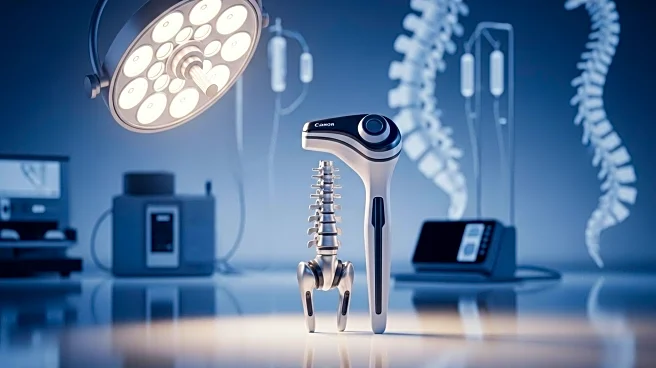What is the story about?
What's Happening?
RevBio, Inc. has been awarded a $2.2 million Phase II SBIR grant from the National Institute on Aging to further develop TETRANITE®, a synthetic bone adhesive for treating complex spine fractures. The grant will support preclinical research aimed at improving vertebroplasty procedures, which traditionally use PMMA to stabilize fractured vertebrae. TETRANITE® offers a biodegradable alternative that addresses PMMA's limitations, such as thermal necrosis and stiffness. The grant will enable RevBio to advance its product towards FDA approval for human clinical trials, potentially offering a new standard of care for vertebral compression fractures.
Why It's Important?
The development of TETRANITE® is crucial as it addresses significant drawbacks of current spine fracture treatments, which have seen a decline due to complications associated with PMMA. With vertebral fractures prevalent among the elderly, a safer and more effective treatment could improve patient outcomes and quality of life. The NIH grant underscores the importance of innovation in medical devices and the potential for TETRANITE® to become a blockbuster product in the orthopaedic market. This advancement could also stimulate further research and investment in biomimetic materials for medical applications.
What's Next?
RevBio will use the grant to complete preclinical testing, a critical step towards FDA approval for clinical trials. Success in these trials could lead to TETRANITE® becoming a new standard of care for spine fractures, potentially replacing PMMA-based procedures. The company may seek additional funding and partnerships to support commercialization efforts. Stakeholders, including healthcare providers and investors, will be monitoring the progress of TETRANITE® as it moves through the regulatory process, anticipating its impact on the treatment of spine fractures.
Beyond the Headlines
The development of TETRANITE® highlights the ethical considerations in medical device innovation, particularly the need for safer alternatives to existing treatments. The use of biomimetic materials raises questions about the future of medical technology and the potential for these materials to transform various aspects of healthcare. The success of TETRANITE® could lead to broader acceptance and integration of biomimetic materials in medical practice, potentially influencing regulatory standards and patient care protocols.















